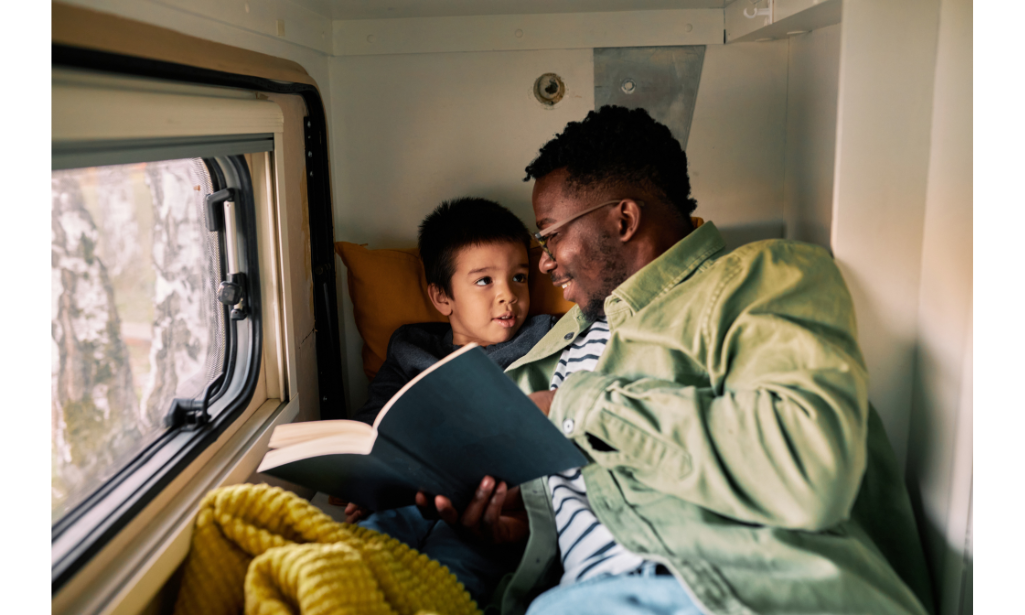So, you have decided to homeschool. Unless you have been around the homeschooling block a few times or are surrounded by homeschooling friends, you may be wondering, now what? Or how does homeschooling work? There are so many things to consider and choices to make, from curriculum to classes to co-ops.
If you are new to homeschooling, you may be a bit overwhelmed. Or even tempted to throw in the towel before you even get started. But homeschooling will be the best decision you make for your children’s education and future, and you can do it!

This three-part blog series will help you, well, figure out how to homeschool! That involves answering questions along the way, such as:
- How does homeschooling work?
- How do I homeschool my kids?
- What are the benefits of homeschooling?
In Part 1, we’ll discuss how homeschooling works. So, let’s get into it!
How Does Homeschooling Work?
If you have researched homeschooling, you know that there are many different styles out there. Unschooling, roadschooling, co-op classes, live online learning–the options run the gamut, and it’s easy to get overwhelmed and confused as to which option best suits your family. But that’s one of the great things about homeschooling! You are free to try different styles of education to find what suits your family and each child best. So, the answer to the question, “How does homeschooling work?” is…it’s however you want or need it to work!
Let’s look at some of the different styles of homeschooling and how they work:
Traditional/School-at-Home Homeschooling
This is the most common kind of homeschooling, the one that often comes to mind when people envision what homeschooling looks like. It’s a broad definition that encompasses different types of teaching and learning, but traditional homeschooling typically involves:

- Lecture-based classes given by a parent, caregiver, or other instructor
- A consistent daily schedule
- Some alignment with the local school district’s curriculum
- Textbooks or a combination of textbooks and online lessons
- A somewhat-traditional classroom setup: desk, storage, wall decorations, a whiteboard, and other items you might find in a school classroom
What traditional/school-at-home homeschooling involves:
- Curriculum: Many families purchase a full-year curriculum, such as Bridgeway Academy’s full-year curriculum kits for grades 1-5, which include everything you need to teach an entire school year. Other families opt to piece together curriculum from a variety of publishers.
- Time and Structure: Traditional homeschooling often demands an abundance of time and organization from the parent/instructor to ensure everything is structured, on schedule, and taught effectively. If this is a path that interests you, but you’re a bit overwhelmed by the prospect of all that work, a partner or academy like Bridgeway can help you with choosing curriculum, handling paperwork, and even doing some of the actual teaching.
- Recordkeeping: While not every state requires you to submit progress reports or paperwork to your local school district, it’s always a wise idea to keep an organized portfolio of assessments, projects, grades, communication between your family and the school district, and any other relevant forms.
Roadschooling
This approach to homeschooling is about as far from traditional as it gets! But roadschooling is growing in popularity because it offers kids hands-on learning experiences they can’t get in a traditional classroom. The general idea behind roadschooling is, as you probably guessed, to take education on the road! Not necessarily by bringing books or computers along in the car (though that is a great way to spend time between destinations). But through literal road trips (and lots of them!) to see and feel and smell whatever it is parents are teaching. For example:

- Instead of reading or lecturing about the American Revolution, parents could set up a road trip to Boston, Philadelphia, and Williamsburg to visit the historic spots where the real events actually occurred.
- Rather than read a book or watch a video about national parks, they could visit a dozen of them across the country, in person, and ask the park rangers any questions they have.
- Why lecture about the Civil War when a family could plot out a trip to as many battle sites as they can fit in?
You get the idea. The possibilities are literally as limitless as your budget. Not only do kids get to learn in a new way, they also get to see the world up close rather than through the print on a textbook page or on a screen.
Note: if you do plan to roadschool, you should establish a home state and follow its laws for homeschooling. The reason for this? Roadschoolers are either on the road often or permanently. In fact, many roadschoolers don’t have a physical home–they travel the country in RVs and mobile homes. There generally needs to be a degree of regulation around homeschooling, which is why it’s required that roadschooling families declare official residence in a particular state. If you maintain residence in a particular state, all you need to do is comply with that state’s rules and regulations (and some are more relaxed than others). If you are living and traveling in a recreational vehicle, you can choose which state will be your “home” and follow those laws accordingly.
Unschooling
A somewhat-unconventional method of homeschooling, unschooling essentially puts a child’s education into his or her own hands. Unschooling is driven by a child’s interests and desire to learn more. Unschooling parents let go of the reins and allow their children to learn organically by discovering. Although it sounds like unschooling lacks any type of structure, it actually utilizes some of the same core characteristics as other types of homeschooling–the child’s learning style, personality, and interests. But this method certainly involves discipline from both the student and the parents.

So, what does an unschooler learn? Anything he or she wants, really. That’s why some families love the freedom that unschooling provides. It lets the child explore his or her interests and learn as much as they can about those topics from the world around them. Some unschoolers forsake curriculum entirely, while others use it for some subjects and allow their children to learn the others on their own.
While unschooling is not technically illegal (it is considered a legitimate form of homeschooling, which is legal in all 50 states), it’s best to check your state’s homeschooling laws for regulations that may be required (record-keeping, assessments, attendance, etc.).
Worldschooling
Worldschooling is like roadschooling to the extreme. It’s a type of education that encourages children to literally see as much of the world as possible. There are several benefits of this type of education–after all, who doesn’t want to travel across the world to learn?

There are a couple different approaches to worldschooling. Some families elect to move to a particular country for a period of time and have their child enroll in a local school to immerse themselves in a new culture and learn new history in a way that they never could in a traditional American classroom. Other families opt to stay. Others might move to another country and do the same thing all over again so their children learn as much about as many cultures as possible.
Yet others may decide to trot the globe, going from country to country for shorter periods of time so their child can learn about even more cultures and histories. This type of worldschooling more than likely would not involve enrolling kids in local schools, opting rather to teach from home…wherever home winds up being.
The one negative to worldschooling? It’s expensive! But, hey, if it’s in your budget, go for it! Legality is another major consideration–be sure to check local laws in whichever state or country you’re looking to stay in. But worldschooling certainly has its perks. Check out this very cool (and very tongue-in-cheek) article written by a woman who worldschooled throughout her childhood.

There are other types of homeschooling as well (Montessori, Charlotte Mason, eclectic, classical, Waldorf, and more), which are worth looking into. But at the end of the day, the answer to the question, “How does homeschooling work?” is fairly open-ended. It works any way that you can and want to make it work, whether that involves setting up a classroom in your home or eschewing home altogether and taking your child’s education on the road.
The next article in this series will dive deeper into some homeschool specifics and answer the question, “How do I homeschool my kids?”
What kind of homeschooling works best for you and your family? Share in the comments below!







